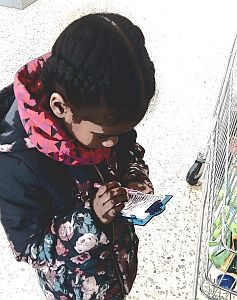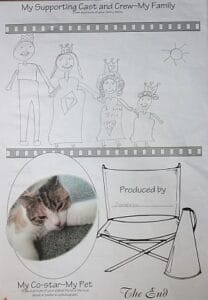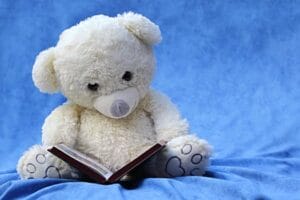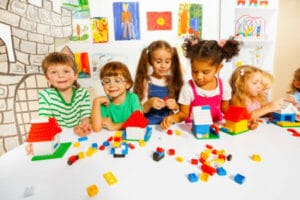Daddy! We didn’t learn ANYTHING at nursery
My year 1 daughter recently uttered the words ‘daddy we didn’t learn anything at nursery’ when I was looking over one of her old scrapbooks with her.
At this point, I should be able to confidently reel off a list of things she did learn BUT I realised I couldn’t. Did she say she didn’t learn anything because she couldn’t remember? After all, nursery for her could seem a lifetime ago OR did she genuinely think she didn’t learn anything?
So what did she learn? I remember each time I dropped her off she’d head straight to the play corner or when I picked her up she’d hand me a piece of paper with some indecipherable scrawls on it.
Ok let me clarify, I know for certain that my daughter ‘learnt something’ while at nursery. In fact she excelled! At nursery she was able to do things that were considered to be ‘beyond her age’ so it is clearly obvious that she ‘learnt’ something.
It seems that the beauty about her time at nursery is that she learnt without realising that learning was taking place. As parents, I think we should be fully aware of the expectations of our nursery-aged children and how we could support them during such a crucial stage in their lives.
Although my daughter has passed the nursery phase, I wanted to find out how nursery-aged children learn and share that information with you.
[wd_ads advert=”7667″]Research has shown that formal education for British children start much earlier that their Scandinavian counterparts yet they lag behind in educational outcomes. Compulsory formal education for children in Sweden and Finland does not begin until the age of seven but they top European league tables in terms of educational outcomes. Clearly starting formal education early is no guarantee of educational success.
Children aged 0-5 who attend nurseries in England or those who are looked after by registered childminders, learn mainly through play. This takes place under the Early Years Foundation Stage (EYFS) Framework devised by the Department of Education. It is compulsory for early years providers. There are no formal assessments but observation records are kept of children’s achievements through each milestone.
I must admit that the word ‘framework’ could be off-putting because it has connotations of being formal. There are parents who totally reject having anything to do with educational framework or guidelines because they view such guidelines as being too prescriptive and ultimately harmful to their child’s development. However I would suggest that, as parents, we should be aware of any milestones our children are expected to reach at particular stages in their lives. This would enable us to give them the relevant support they need in ways that would suit them as individuals.
The EYFS Framework covers seven areas of learning and development. Without being too technical, these are broken down into three prime areas and four specific areas.
The three prime areas are:
Communication and language –this involves giving children opportunities to experience a rich language environment; to develop their confidence and skills in expressing themselves; and to speak and listen in a range of situations.
Physical development – this area involves providing opportunities for young children to be active and interactive; and to develop their co-ordination, control, and movement. Children must also be helped to understand the importance of physical activity, and to make healthy choices in relation to food.
Personal, social and emotional development (or PSED) – this area involves helping children to develop a positive sense of themselves, and others; to form positive relationships and develop respect for others; to develop social skills and learn how to manage their feelings; to understand appropriate behaviour in groups; and to have confidence in their own abilities.
The three prime areas are seen as being vital for kick-starting children’s curiosity and enthusiasm for learning, building their capacity to learn, helping them to form relationships and helping them to thrive.
The four specific areas are:
Literacy – children are encouraged to link sounds and letters and to begin to read and write.
Mathematics – children are given the opportunity to hone their skills in counting, and using and understanding numbers.
Understanding the world- this involves helping children to make sense of their physical world and their community.
Expressive arts and design- involves enabling children to explore and play with a wide range of materials and giving them the opportunity to share their thoughts and feelings through a range of activities such as role-play, music, dance, design and technology.
The four specific areas are used as vehicles to develop and strengthen the three prime areas.
Looking at the seven areas of the EYFS framework curriculum above, which childcare providers are obliged to follow, you can begin to see how it is possible for children to learn and develop skills without them realising that they are ‘learning something.’
So when my daughter headed straight to the play corner when I dropped her off at nursery or when she gave me pieces of paper with indecipherable scrawls on them when I picked her up, vital learning was taking place but in a manner which was not formal or restrictive for her. With hindsight, I should have asked her what the scrawls meant to her.!!
Want to find out more?
There are a number of guides available:
A Parent’s Guide to The Early Years Foundation Stage- this publication offers parents a quick insight into EYFS. You can view a copy here.
What to Expect, When – this parent-friendly guide gives you ideas on specific things you can do to help your child develop through play. Space is also provided for you to record the progress of your child through each EYFS stage. You can view a copy here.
Development Matters in the Early Years Foundation Stage(EYFS) – a parent-friendly guide showing you goals your child should reach at each stage (age 0-5) and how you can create the opportunities for them to achieve those goals. You can view a copy here.
The Statutory Framework for the Early years Foundation Stage – this publication is not parent-friendly because it is aimed at registered childcare providers. It shows the full framework and may not be a particularly easy read! However. it’s worth taking a look to know exactly how your childcare provider should cater for your child’s development. You can view a copy here.
Sourcing resources to help your child learn through play.
There are a number of websites which provide resources to help your child to learn through. Play the suggestions below will suit all budgets.
Elc.co.uk -The Early Learning Centre specialises in resources aimed at children at the Early Years Foundation Stage (EYFS). Their range spans toys, games, books construction sets and more.
LearningResources.com -also specialises in resources for EYFS learners. Their range covers active play, fine motor skills, exploration and critical thinking to name a few.
TheWorks.co.uk stocks a range of bundled books and craft materials which are great for encouraging learning through play.
Argos.co.uk has a large range of roleplay toys to choose from covering, shopping, cleaning, building and cooking role play.
Tesco.com is good for those particularly looking for cooking role-play toys
GLTC.co.uk stocks high-quality roleplay toys in the upper price range
Join our mailing list
Sign up to our Emailing List & Get the Latest Information and Offers on Resources
Thank you for joining !
Something went wrong.




